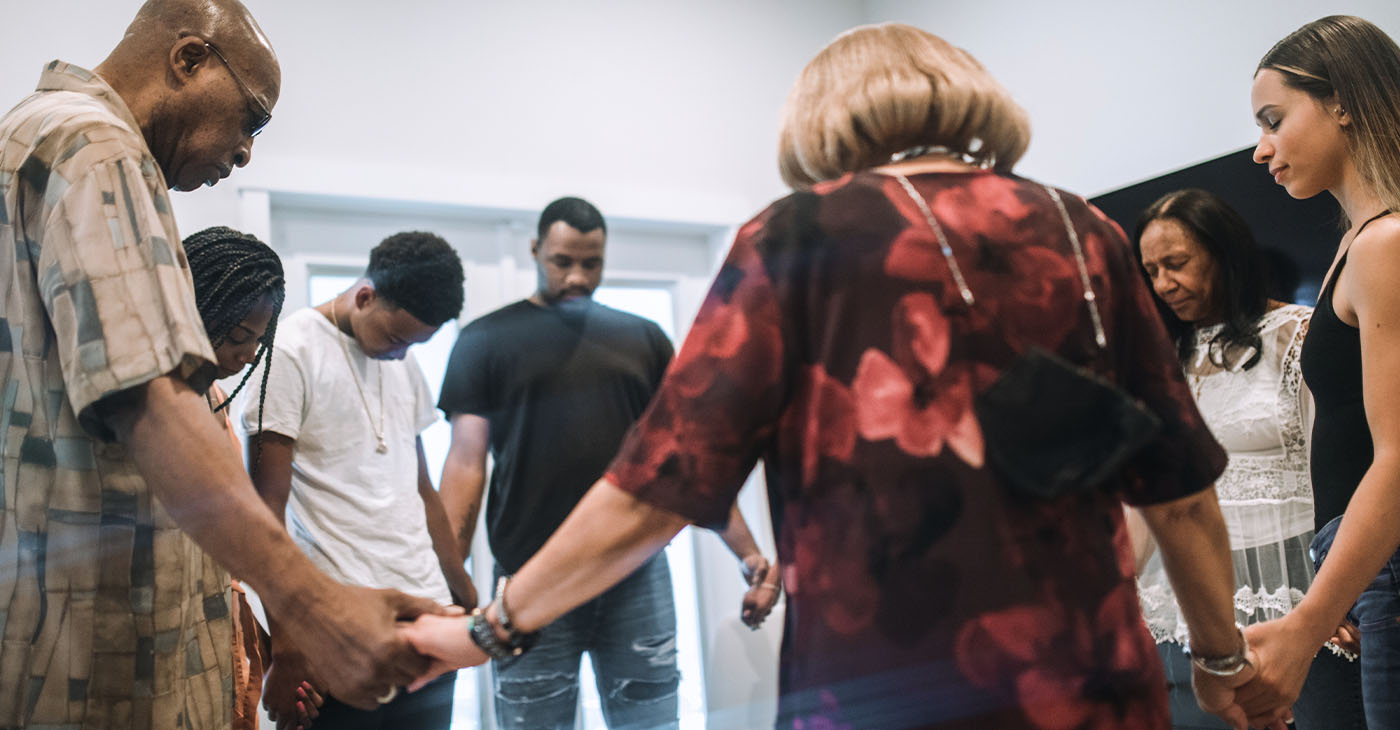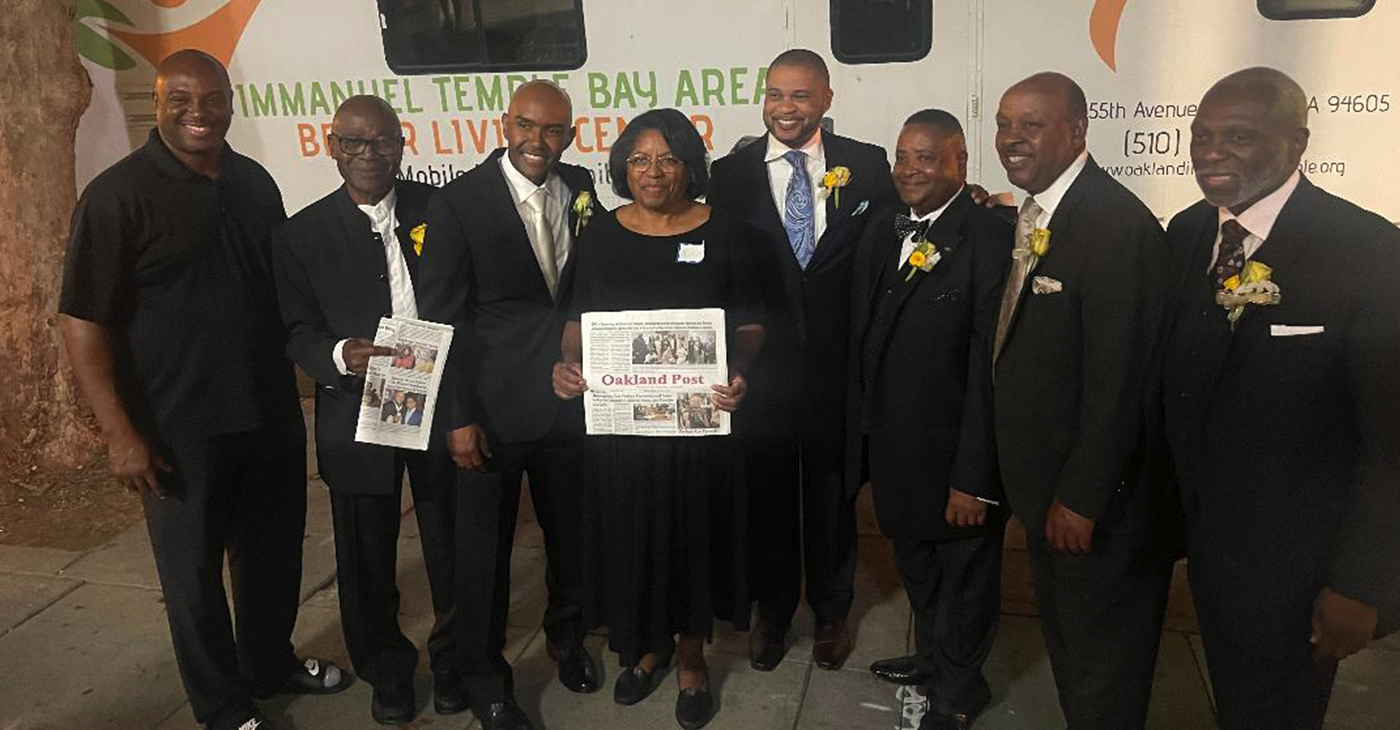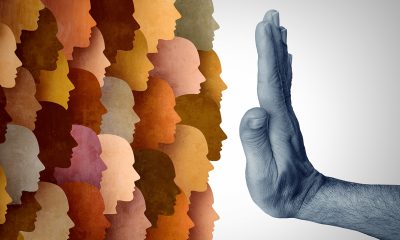Religion
Justices Appear to Favor Muslim Denied Job Over Headscarf

Samantha Elauf stands outside the Supreme Court in Washington, Wednesday, Feb. 25, 2015. The Supreme Court is indicating it will side with a Muslim woman who didn’t get hired by clothing retailer Abercrombie & Fitch because she wore a black headscarf that conflicted with the company’s dress code to her job interview. (AP Photo/Pablo Martinez Monsivais)
MARK SHERMAN, Associated Press
WASHINGTON (AP) — Have you heard the one about the Sikh, the Hasidic Jew, the Muslim and the nun who walked into a job interview?
Supreme Court Justice Samuel Alito channeled his inner stand-up comic Wednesday in indicating that he and most of the court would side with a Muslim woman who showed up for a job interview with Abercrombie & Fitch wearing a black headscarf. She didn’t get hired.
Samantha Elauf, the woman at the center of the case about religious discrimination in hiring, was in the courtroom Wednesday. The case turns on how an employer is supposed to know that a worker or applicant has religious beliefs that need to be accommodated.
The clothing retailer said Elauf can’t claim discrimination because she didn’t say anything about religion during her interview.
Alito acknowledged that it sounded like he was making a joke in describing interviews with “a Sikh man wearing a turban,” “a Hasidic man wearing a hat,” ”a Muslim woman wearing a hijab” and “a Catholic nun in a habit.” But his point was that employers can’t feign ignorance when people appear before them in religious clothing.
“Now, do you think … that those people have to say, we just want to tell you, we’re dressed this way for a religious reason. We’re not just trying to make a fashion statement,” Alito said.
Pressed by both conservative and liberal justices, Abercrombie lawyer Shay Dvoretzky said employers would get into trouble if they started making assumptions about people. “What we want to avoid is a rule that leads employers, in order to avoid liability, to start stereotyping about whether they think, guess or suspect that somebody is doing something for religious reasons,” Dvoretzky said.
Only Justice Antonin Scalia seemed open to the company’s argument.
Several of Scalia’s colleagues said there’s an easy way to avoid stereotyping. Tell job applicants what the rules are and ask them, as Justice Sonia Sotomayor said, “You have a problem with that?”
Those conversations sometimes might be awkward, Justice Elena Kagan said. But far better the awkward moments than a situation that leads to stereotyping anyway, Kagan said.
Indeed, Alito made the point that despite Elauf’s silence, the company assumed she would wear a headscarf to work because of her religion.
“You assumed she was going to do this every day. And the only reason she would do it every day was because she had a religious reason,” he said.
The federal civil rights law known as title VII requires employers to make accommodations for employees’ religious beliefs in most instances. Dvoretzky said the Equal Employment Opportunity Commission, representing Elauf, wants employers to treat people differently based on religion, “which is precisely the opposite of what Title VII wants.”
That provoked a sharp reply from Justice Ruth Bader Ginsburg. “Title VII requires them to treat people who have religious practice differently. They don’t have to accommodate a baseball cap. They do have to accommodate a yarmulke,” Ginsburg said, referring to a Jewish skullcap.
Abercrombie has continued to fight Elauf’s lawsuit, filed on her behalf by the EEOC, even though it since has settled similar claims and changed its headscarf policy. The ban on black clothing remains part of its Look Policy for employees.
Elauf was 17 when she interviewed for a “model” position, as the company calls its sales staff, at an Abercrombie Kids store in a shopping mall in Tulsa, Oklahoma, in 2008. She impressed the assistant store manager. But her application faltered over her headscarf, or hijab, because it conflicted with the company’s Look Policy, a code derived from Abercrombie’s focus on what it calls East Coast collegiate or preppy style.
At the time of the interview, the policy required employees to dress in a way consistent with the clothing Abercrombie sells, and it prohibited wearing headscarves or anything in black.
The woman who conducted the interview consulted with a more senior supervisor and then decided not to hire Elauf because of the headscarf, according to testimony in the case. “The only reason there was a suit here was because she was honest,” Sotomayor said, calling the interviewer’s candid comment rare in employment discrimination cases.
After Elauf complained, a jury eventually awarded her $20,000. But the federal appeals court in Denver threw out the award and concluded that Abercrombie & Fitch could not be held liable because Elauf never asked the company to relax its policy against headscarves.
Organizations of state and local governments are supporting the company out of concerns that, if the EEOC prevails, they would be subject to more discrimination claims as large employers.
Muslim, Christian and Jewish advocacy organizations have weighed in on Elauf’s side, as have gay-rights groups.
A legal brief on behalf of Orthodox Jews argues that requiring job applicants to voice the need for religion-related special treatment makes them less likely to be hired, with no reason given for the decision. Orthodox Jews who wear a skullcap, or who may not work on Saturdays, are routinely advised to withhold that information until after they are hired, lawyer Nathan Lewin said in his Supreme Court filing.
A decision in EEOC v. Abercrombie & Fitch, 14-86, is expected by late June.
___
Follow Mark Sherman on Twitter at: http://www.twitter.com/shermancourt
Copyright 2015 The Associated Press. All rights reserved. This material may not be published, broadcast, rewritten or redistributed.
#NNPA BlackPress
COMMENTARY: Prayer is Your Power
Terrible things happen to good people often. We live in an unjust world with people making decisions that are informed more by profit than people. We cannot take those principles into our relationship with God. We must believe that “… all things work together for good to them that love God, to them who are the called according to His purpose.”

Faithful Utterances
By Dr. Froswa Booker-Drew | Texas Metro News
This week, a friend informed me that she was following the ambulance to the hospital with her husband. Her husband was going through a major health crisis. She wasn’t the only one who reached out—a friend’s mother had unexplained pain and another friend contacted me about her friend’s son who was hospitalized with pneumonia. Each of them asked that I pray for them.
I consider it an honor to pray for others. Prayer is powerful and I love that I have a group of friends who I can turn to that I call the “prayer warriors” that when I send a text to lift up the concerns and issues of others before God, they go into battle mode.
Prayer is a weapon and I think many of us don’t understand its power until we need it. For many of us, it’s a routine, something that’s more about religion than it is about relationship. We have gotten prayer twisted as some exchange solely for stuff. God is not a celestial Santa Claus dropping off gifts. Prayer is an opportunity to go before to God sincerely in relationship. “And when you pray, you must not be like the hypocrites. For they love to stand and pray in the synagogues and at the street corners, that they may be seen by others.
Truly, I say to you, they have received their reward. But when you pray, go into your room and shut the door and pray to your Father who is in secret. And your Father who sees in secret will reward you. And when you pray, do not heap up empty phrases as the Gentiles do, for they think that they will be heard for their many words. Do not be like them, for your Father knows what you need before you ask Him.” (Matthew 6:5–8)
Prayer is about faith. It is believing that God hears us. “Let us then with confidence draw near to the throne of grace, that we may receive mercy and find grace to help in time of need.” (Hebrews 4:16) I realize that my prayers are even more powerful when I am in relationship with others seeking God: “For where two or three are gathered in my name, I am there among them” (Matthew 18:20). It’s dangerous when we see prayer as a way to manipulate God into doing what we want. There is nothing wrong with bringing your requests before God but it’s important to check our motivation and intention. It’s also important to know that just because God doesn’t answer our prayers in the way that we want does not mean that God doesn’t love us.
It doesn’t mean that God does not hear us. It does not negate the omnipotence or goodness of God, either. We must believe that God is able. “And without faith it is impossible to please God, because anyone who comes to him must believe that He exists and that He rewards those who earnestly seek him.” (Hebrews 11:6) It’s easy to blame God when things don’t go the way we want them to—”the rain falls on the just and the unjust” (Matthew 5:45).
Terrible things happen to good people often. We live in an unjust world with people making decisions that are informed more by profit than people. We cannot take those principles into our relationship with God. We must believe that “… all things work together for good to them that love God, to them who are the called according to His purpose.” (Romans 8:28) …. God is concerned with our hearts, with people and cares for us even when things don’t go the way we’d like. I can report that all of the individuals we prayed for had excellent results.
God is good! Yet, I realize that this isn’t always the case. Prayer is powerful. God wants us to have this daily form of communication. 1 John 5:14, tells us: “And this is the boldness we have in Him, that if we ask anything according to His will, He hears us.” Don’t use prayer just when you need something. Just as all relationships require consistent communication for growth and results, the same is even more important in our relationship with God. Prayer is a powerful partnership with God that can move mountains when we believe!
Dr. Froswa’ Booker-Drew is the host of the Tapestry Podcast and the author of three books for women. She is also the Vice President of Community Affairs for the State Fair of Texas. To learn more, visit drfroswa.com.
Black History
AFRICAN-ISH: The First Christmas Story
Both Joseph and Mary were of the lineage of David, Joseph descended from David’s son Solomon (and Bathsheba), and Mary extended from another son Nathan. Therefore, they were required to go to the little town of Bethlehem, in Judea and there, in a cattle shed Jesus was born. (Bethlehem is 70 miles south of Nazareth and 5 miles southwest of Jerusalem).

By Simon Burris
The narrative of Jesus’ birth and proof of his Hamitic (Black) African bloodline* began in the Old Testament in the book of Genesis chapter 10, in the Land of Ham, located in southwest Asia and Africa. Three most prominent Hamitic personalities: Abraham, Isaiah and David.
People and places of Hamitic origins are underlined.
(1) Abraham the patriarch was Babylonian (Ethnic Ethiopian). Gen. 11:31; (2) Isaiah a prophet lived 750 years before Christ, predicted the virgin birth was a nephew of Amaziah a Judahite (Canaanite) king; and (3) David the great king of Israel was a descendant of Abraham, also of Tamar and Rahab (Canaanites).
The (Hamitic) Genealogy of Jesus Christ: Matthew 1:1-17; Luke 3:23-34
The Birth of Jesus: (about 6-4 BC)
Mary the virgin mother of Jesus and her husband Joseph the “foster” father of Jesus, a carpenter, lived in Nazareth, a town in northern Palestine.
At this time Emperor Augustus of the Roman Empire decreed that a census would be taken. Everyone in his domain had to go to his or her hometown to register. He probably ordered Cyrenius ( Quirinius ) the Afro Roman governor of Syria / Judeadistrict to take charge and supervise the mandate.
Both Joseph and Mary were of the lineage of David, Joseph descended from David’s son Solomon (and Bathsheba), and Mary extended from another son Nathan. Therefore, they were required to go to the little town of Bethlehem, in Judea and there, in a cattle shed Jesus was born. (Bethlehem is 70 miles south of Nazareth and 5 miles southwest of Jerusalem).
A short time later shepherds from the countryside as well as Wise Men (Magi) from neighboring countries Arabia, Babylonia,and Persia traveled to the nativity site, paid homage and worshiped the infant-Savior.
Now Joseph was warned by the Lord in a dream that Herod the Edomite king of Judea was plotting the murder of the child, fled with his family to Egypt, returning to Nazareth after the death of Herod.
Jesus had siblings, brothers Joseph, Simon, Epistle writers James, Jude, and several sisters. The last mention of Joseph occurs in the Gospel of Luke when he and Mary take the 12-year-old Jesus to Jerusalem. Mary played a vital role all through Jesus’ life, from the day He was born till the time of the crucifixion.
Conclusion: The four Gospels: Matthew, Mark, Luke and John chronicled the full theme of Christ as the universal Savior. *Descendants of Ham’s sons Cush (Ethiopia), Mizraim (Egypt), Put (Libya) and Canaan (Ancient Palestine/Israel). Genesis 10: 6-20
Footnotes: Why is Christmas celebrated on December 25?
The ancient Romans celebrated the winter solstice on December 25 as the birthday of the SUN; the Babylonians and Persians -SON of the SUN. Some 300 plus years after Jesus’ earthly demise, Roman Emperor Constantine in 336 legalized this date as the birthday of the SON of GOD – JESUS the CHRIST! Originally: Christ’s Mass.
Eurocentric racism: Pope Julius II in 1508 commissioned Michelangelo, Raphael and other Renaissance artists and church scholars to portray and depict almost all major biblical characters as Europeans (Caucasians), save servants and slaves.
Activism
SDA Churches Join Outreach Efforts to Find Solutions to Upsurge of Violence
the Northern California Conference of Seventh Day Adventists (SDA) held their annual Convocation at Grand Avenue Seventh Day Adventist Church in Oakland. Seven hundred people came together in celebration and worship. The theme was “Embracing Change.”

By Post Staff
On Oct. 8, the Northern California Conference of Seventh Day Adventists (SDA) held their annual Convocation at Grand Avenue Seventh Day Adventist Church in Oakland. Seven hundred people came together in celebration and worship. The theme was “Embracing Change.” The guest speaker was Dr. Myron Edmonds, who pastors in Cleveland, Ohio. He spoke about how Christ wasn’t a traditionalist, and the work isn’t being done because some in the church don’t wish to change and they tend to demonize new ideas.
Throughout the day, the Mobile Medical Health Van operated by Immanuel Temple Seventh Day Adventist Church out of Oakland sat in front of the church and provided health screenings and community resource information to the general public. The Medical Van, which was gifted to the church by Pastor Raymond Lankford of Healthy Communities, has provided free health care services throughout Alameda County for the last few years. The prayer of Pastor Damon Washington of Immanuel Temple Church, who was ordained during the afternoon program, is for their health ministry to partner with the other providers like OPIC and Oakland Workforce Agencies and to combat the ongoing health disparities and violence within the city and beyond.
They have pledged to work with the Chaplains, the OPIC and the Formerly Incarcerated Giving Back, who want to make amends for the damages they have done to harm Oakland.
-

 Community3 weeks ago
Community3 weeks agoFinancial Assistance Bill for Descendants of Enslaved Persons to Help Them Purchase, Own, or Maintain a Home
-

 Business3 weeks ago
Business3 weeks agoV.P. Kamala Harris: Americans With Criminal Records Will Soon Be Eligible for SBA Loans
-

 City Government4 days ago
City Government4 days agoCourt Throws Out Law That Allowed Californians to Build Duplexes, Triplexes and RDUs on Their Properties
-

 Activism4 weeks ago
Activism4 weeks agoOakland Post: Week of April 10 – 16, 2024
-

 Activism2 weeks ago
Activism2 weeks agoOakland Post: Week of April 24 – 30, 2024
-

 Community3 weeks ago
Community3 weeks agoAG Bonta Says Oakland School Leaders Should Comply with State Laws to Avoid ‘Disparate Harm’ When Closing or Merging Schools
-

 Community3 weeks ago
Community3 weeks agoRichmond Nonprofit Helps Ex-Felons Get Back on Their Feet
-

 Community3 weeks ago
Community3 weeks agoOakland WNBA Player to be Inducted Into Hall of Fame






















































